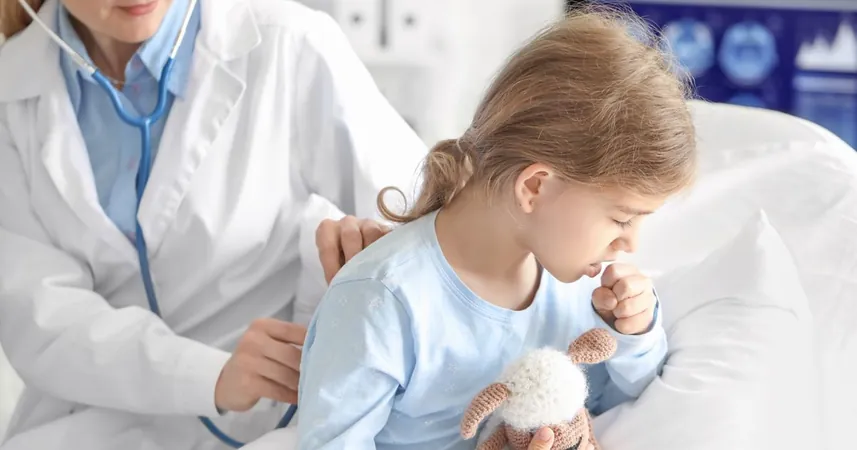
Unmasking a Winter Health Crisis: Beware the Silent Threats Beyond COVID, Flu, and RSV in North Carolina!
2024-12-31
Author: Ling
Introduction
This winter, as temperatures drop and holiday gatherings fill the calendar, a wave of illness is sweeping through North Carolina – but it's not just COVID-19, flu, and RSV that we need to worry about. Doctors are raising alarms about a host of other viral and bacterial infections that could leave you feeling under the weather.
Surge in Infections
Dr. David Weber from UNC Hospitals has reported a notable surge in various infections this season. “We’re witnessing an unprecedented increase in other viral diseases such as enteroviruses and rhinoviruses. These have been circulating widely for weeks, often outpacing both flu and RSV in the number of cases,” he explained.
Mycoplasma Pneumonia
One particularly concerning illness is mycoplasma pneumonia, also known as atypical or walking pneumonia. Dr. Weber noted that UNC Hospitals is currently observing an average of 50 positive cases of this infection each week, especially among children. “Mycoplasma pneumonia often peaks during the winter months, but cycles of increased activity can last several years. Right now, we are definitely seeing a peak in cases,” he pointed out.
Rise in Pertussis
In addition to these, there's also been a concerning rise in pertussis, commonly known as whooping cough.
Hospitalization Data
Recent data from North Carolina’s respiratory virus dashboard indicates that respiratory symptoms accounted for approximately 9% of emergency department visits statewide. Alarmingly, there were already over 1,100 hospitalizations recorded by mid-December, and Dr. Weber anticipates that this number has likely spiked following the holiday season with families gathering and traveling more.
Impact of Winter Conditions
“Historically, we see a spike in respiratory illnesses after holidays like Thanksgiving, Christmas, and New Year’s,” Weber stated. “This year is no different. Respiratory viruses including RSV, COVID-19, and influenza thrive in colder temperatures and low humidity, which we typically experience in the winter. Plus, spending more time indoors where heating dries out mucous membranes makes us more susceptible to these viruses.”
Common Symptoms
Symptoms of the currently circulating illnesses often overlap, presenting as cough, fever, runny or stuffy nose, headaches, and sore throats. Dr. Weber stressed the importance of vaccination and early testing to combat the risk of severe infections. “For our outpatients, we perform a 4-Plex test that screens for COVID, RSV, and both types of influenza A and B. Quick treatment is essential, particularly for those with underlying health conditions or the elderly,
Treatment Options
Fortunately, there are effective treatments for these respiratory ailments, including oral therapies for COVID-19 that must be administered within five days of symptom onset.
At-Home Testing
To help with early diagnosis, at-home combination COVID-Flu tests are becoming increasingly available and can help pinpoint the root of your illness. Dr. Weber also mentioned the distinction between treatments for bacterial and viral illnesses, emphasizing that while bacterial infections can often wait for treatment, viral infections require prompt action.
Guidelines for Recovery
If you’re feeling unwell, it is highly recommended to stay home from work and school until at least 24 hours after your symptoms start to improve and you've been fever-free without medication. Additionally, those recovering from COVID-19 should wear a mask for five days to minimize the risk of spreading the virus.
Conclusion
With the winter season upon us, it's more important than ever to stay vigilant and informed about the possible health risks lurking around the corner. Don't let the common cold catch you off guard – stay safe, stay healthy, and protect those around you!


 Brasil (PT)
Brasil (PT)
 Canada (EN)
Canada (EN)
 Chile (ES)
Chile (ES)
 Česko (CS)
Česko (CS)
 대한민국 (KO)
대한민국 (KO)
 España (ES)
España (ES)
 France (FR)
France (FR)
 Hong Kong (EN)
Hong Kong (EN)
 Italia (IT)
Italia (IT)
 日本 (JA)
日本 (JA)
 Magyarország (HU)
Magyarország (HU)
 Norge (NO)
Norge (NO)
 Polska (PL)
Polska (PL)
 Schweiz (DE)
Schweiz (DE)
 Singapore (EN)
Singapore (EN)
 Sverige (SV)
Sverige (SV)
 Suomi (FI)
Suomi (FI)
 Türkiye (TR)
Türkiye (TR)
 الإمارات العربية المتحدة (AR)
الإمارات العربية المتحدة (AR)